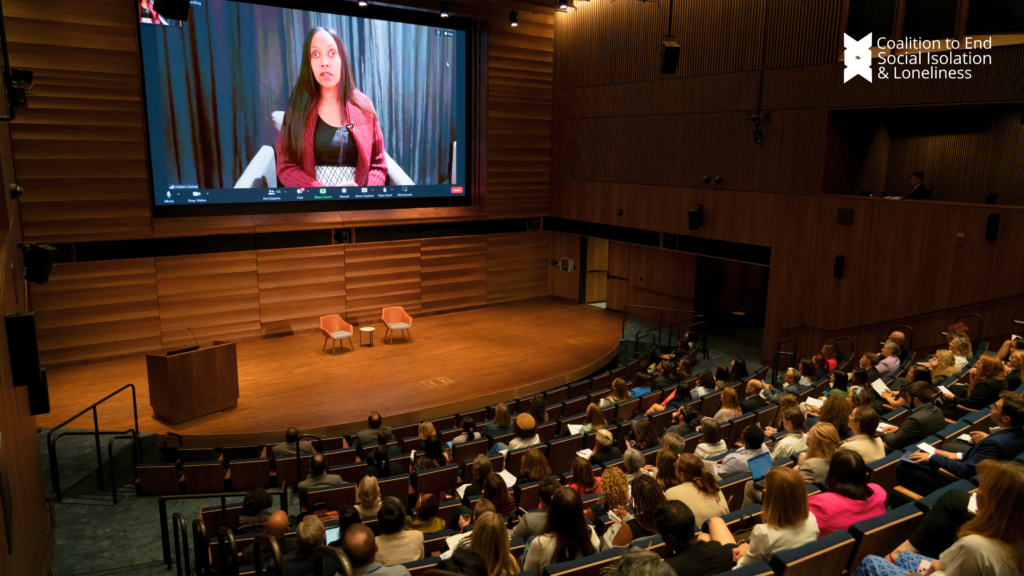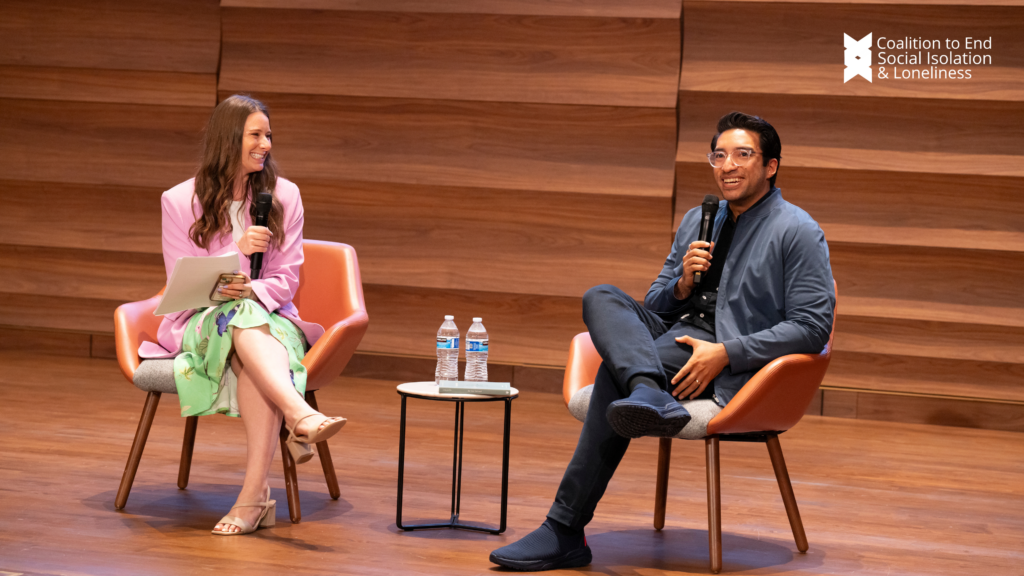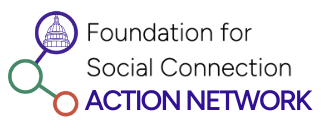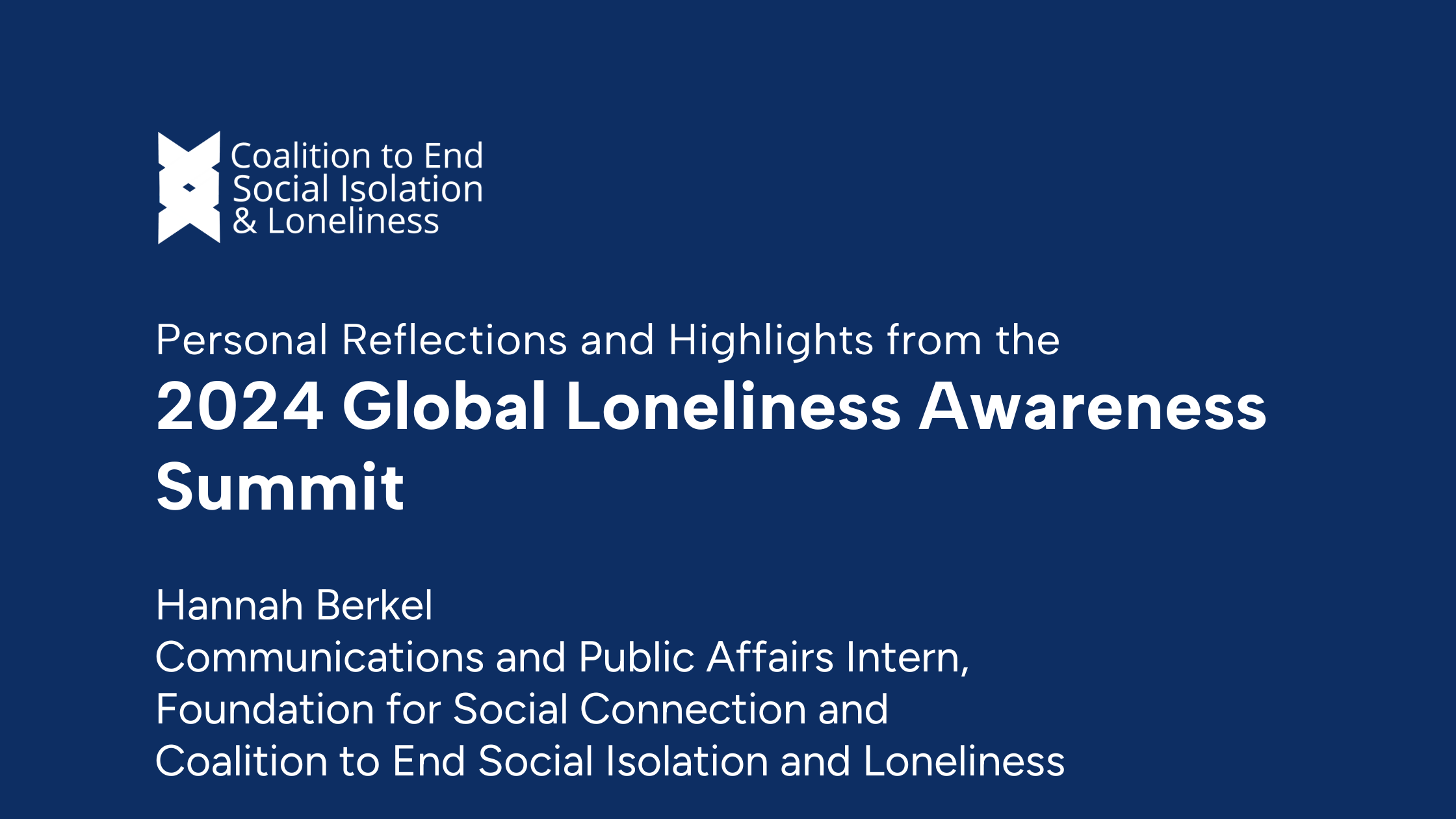The third annual Global Loneliness Awareness Summit held in D.C. this June was an incredible opportunity for policymakers, practitioners, researchers, and more to come together in the spirit of connection. The Johns Hopkins Bloomberg Center for Public Innovation provided us with a welcoming space that facilitated social connection and conversations among attendees. The day was full of discussions from both attendees and thought provoking speakers that highlighted a range of innovative ideas and key statistics, emphasizing the importance of working together and addressing social isolation and loneliness through diverse and inclusive approaches. Throughout the event, three main themes emerged: the importance of collaboration, everyone has a role to play, and we need to meet communities where they are.
During the Summit, I was lucky enough to attend Haben Girma’s keynote and the subsequent panel on “People: Understanding Social Isolation & Loneliness Across Diverse Communities,” both of which embodied all three themes.
Haben Girma, a disability rights advocate and WHO Commissioner for Social Connection, noted that marginalized communities can create innovative solutions that benefit everyone when they lead the solutioning process. By uplifting their voices and centering their needs, we all can benefit.

Pictured above: Haben Girma on screen speaking to a room full of attendees
The later panel affirmed this sentiment and also shared insights into how we can be more inclusive of other communities at-risk for social isolation and loneliness, like younger and older adults as well as people living with cancer. As they highlighted, the inclusion of these diverse groups at the table can help practitioners and policy makers affect systems-based change for our collective health and well-being.
Another highlight of the event was hearing from our Capitol Hill champions throughout the day who have advocated for and created legislation to address social isolation and loneliness nationwide. These bipartisan, bicameral champions include Sens. Maggie Hassan (D-NH) and Tina Smith (D-MN) and Reps. Mike Flood (R-NE) Seth Moulton (D-MA). The Coalition has been honored to work alongside these legislators and others to create change at the federal level and look forward to continuing our work with their offices to enact our policy recommendations.

Pictured above: Jillian Racoosin and Yung Pueblo sit for their fireside chat
Author and poet Diego Perez (better known by his persona Yung Pueblo) could not have ended the day on a more fitting and inspiring note. As he stated during his fireside chat with the Coalition’s Executive Director, Jillian Racoosin, “It does not take that many people to change the world…If we’re well organized, we can connect our energy in a manner where we can undo this isolation.” Ultimately, we must all work together and learn from one another to succeed in achieving a more connected future, where all can thrive.
Key Calls to Action
Since we all have a role to play in creating connection, speakers and topics from the day revealed key calls to action that we can all take to improve social connection and reduce social isolation and loneliness (SIL) at a local, state, national, and global level.
Practitioners and Researchers can:
- Learn from those with lived experience of SIL as well as communities most impacted by these experiences. Invite members of these groups to the decision-making table and into research endeavors.
- Integrate public service or work-related (e.g., employment, volunteering) components into social isolation and loneliness interventions and programs
- Become a member of the Coalition to End Social Isolation to contribute to the growing work of addressing social isolation and loneliness.
Policymakers and advocates should:
- Embrace the bipartisan nature of social connection and actively engage with decision-makers across the aisle. Social isolation and loneliness does not discriminate based on political affiliation – it impacts everyone.
- Champion for legislation including Measurements for Loneliness and Isolation Act of 2023 (H.R. 6284) – the first piece of bipartisan and bicameral legislation targeting this issue, the Community Mental Wellness and Resilience Act (H.R.3073, S.1452), and the National Strategy for Social Connection Act (H.R. 8490, S.2350),
- Invest resources into standardizing measurements of SIL and encourage data collection to gain a comprehensive understanding of individual communities.
These are only just a handful of my favorite highlights from our summit. For more takeaways and calls to action from the event, we invite you to read the full report here.

